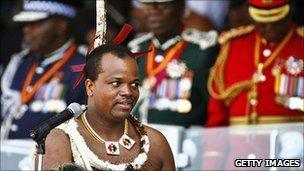Swaziland turns to South Africa for financial bailout
- Published

King Mswati has been ruling Swaziland since 1986
Swaziland has asked South Africa for a financial bailout as it risks running out of money, South Africa's top foreign affairs official says.
The official, Jerry Matjila, told MPs in Cape Town that Swaziland needed the money to pay its civil servants.
South Africa's opposition said the request should be rejected because Swaziland was an "undemocratic state".
Swaziland is one of Africa's poorest countries and is governed by an absolute monarch.
Mr Matjila, who heads South Africa's International Relations department, said Pretoria was considering the request.
"The question is how much can we help. We want a stable continent. We start with our neighbours," Bloomberg news agency quotes Mr Matjila as saying.
'Lavish lifestyle'
A spokesman for the opposition Democratic Alliance (DA), Kenneth Mubu, told the BBC's Focus on Africa that the government should not "prop up" the government of King Mswati III.
"It must first democratise, respect human rights and allow free political activity," Mr Mubu said.
He added that South Africa should also demand that King Mswati, who has 13 wives, end his lavish lifestyle as a pre-condition for aid.
"The king must reduce his expenditure which is a very big proportion of Swaziland's budget," he said.
The Swazi monarchy banned political parties nearly 40 years ago.
In April, police fired teargas to break up pro-democracy protests organised by trade unions.
Swaziland is Africa's third-largest sugar producer, but it lost about a third of its revenue last year after it was badly affected by the global economic crisis.
Swaziland's government said last week it has asked the World Bank and African Development Bank for "budget support loans", and it was also considering other sources of funding.
According to South Africa's Business Report newspaper, the Swazi government has cut the salaries of politicians by 10% because of the financial crisis.
King Mswati has also cancelled his silver jubilee celebrations, due to take place later this year, the paper said.
- Published12 April 2011